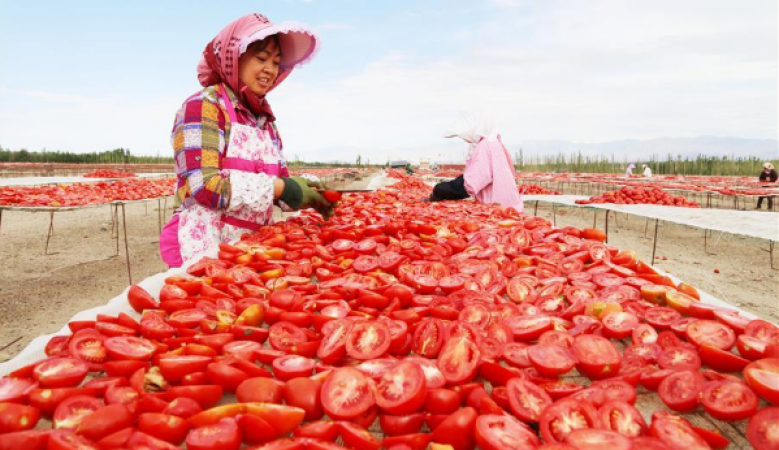
Washington: The two pillars of local agriculture, known as "white and red", have had very different results since a widespread US embargo on goods from China's Xinjiang region in June.
Tomato and cotton production in Xinjiang, which provides a quarter of the world's tomatoes and a fifth of cotton, are both essential components of the global supply chain. However, cotton has suffered the most, as both were labeled as "high risk" by the US under the Uighur Forced Labor Prevention Act.
Also Read: Huobi's Chinese founder sells a majority stake to a Hong Kong fund
While most of the cotton produced in the region is used locally or sold to other provinces to turn into clothing and textiles, most of Xinjiang's tomato products are exported directly, making it easy to adapt to changes in global demand. theoretically become more sensitive. However, the tomato industry has remained largely stagnant, while the price of Xinjiang cotton has fallen.
Why did the US have only minor effect of the ban on Xinjiang tomatoes?
Simply put, the United States does not import tomato products from Xinjiang. The US is one of the largest producers of tomatoes in the world, especially in the state of California.
The country imports large quantities of tomatoes from Canada and Mexico under the terms of the North American Free Trade Agreement.
In the first seven months of 2022, Xinjiang's tomato products were exported to more than 80 countries in Europe, Asia, Africa and Oceania.
Italy has been the top importer, taking in about 20% of exports from the autonomous region from January to July, according to China customs data.
Also Read: China improves transportation connections with Russia's abundantly resourced Far East
Russia, which accounted for 16% of all exports, was followed by Ghana and the Philippines, which each bought about 6% of the total.
In the first seven months of the year over 96% of tomatoes exported were in large barrels of tomato paste, each typically weighing more than 5 kg (11 lbs).
According to the United Nations Food and Agriculture Organization, China is the world's top producer of tomatoes, accounting for 35% of global production in 2020.
Due to various geographical factors, Xinjiang has become China's top producer. It covers latitude 34–49 north, which is ideal for tomato growing, and has a wide difference in day and night temperatures.
According to estimates, the region produces 80% of China's tomato crop. With the help of Italian traders, Xinjiang's tomato cultivation and processing industry began in 1978. Most of the production since then has been for export.
Xinjiang exported more than 290,000 tonnes of tomato paste worth US$256 million in the first seven months of this year, which was 53.7% of the total tomato paste exports from the nation during that time.
How will the region adapt to rising geopolitical tensions?
Like cotton, the Xinjiang tomato industry has been tarnished by claims of forced labor, which Beijing has vehemently denied.
Uncertainty remains despite the fact that the US is not a major export market and the "forced labor" bill has had little impact on the sector. According to a proposal by the European Commission, the sale of goods made using forced labor would be prohibited.
Leading tomato processing businesses in Xinjiang are aware of the risks and have suggested mitigating them by promoting sales in the domestic market.
State-owned COFCO Sugar, Asia's largest tomato processing company and No. 2 globally, said it has expanded into the domestic market to avoid export risks, according to the company's 2021 annual report.
Another top processing company, Xinjiang Guanong Fruit, claimed that because the region is known for producing large buckets of tomato paste, its production is diversified and heavily dependent on the global market.
In its annual report, it said that "trade policies and the current state of the global economy will have an impact on the export and sale of tomato paste products."
"Tomato industry faced many difficulties in the 2021 production season with respect to raw material supply, price and foreign trade transportation cost."
These issues may still exist in 2022, and their impact on the survival and growth of tomato production businesses may vary.